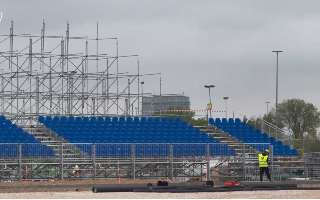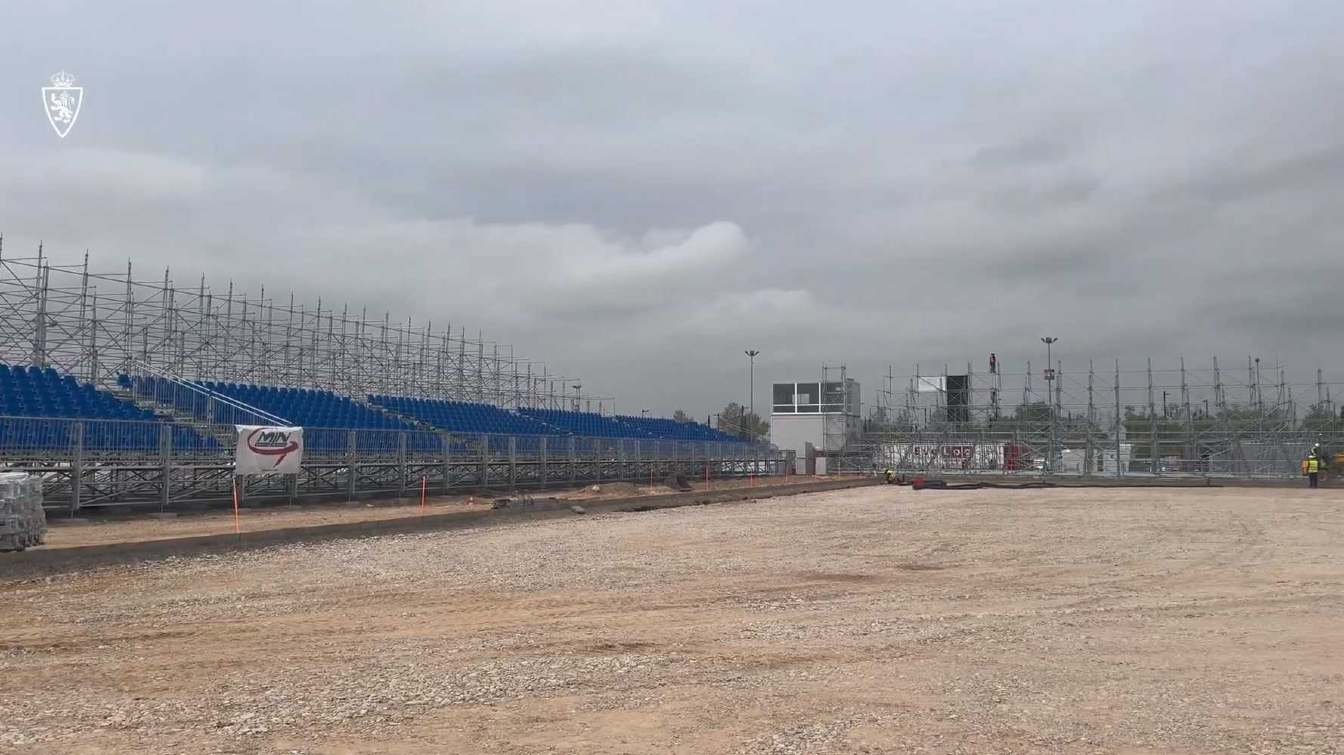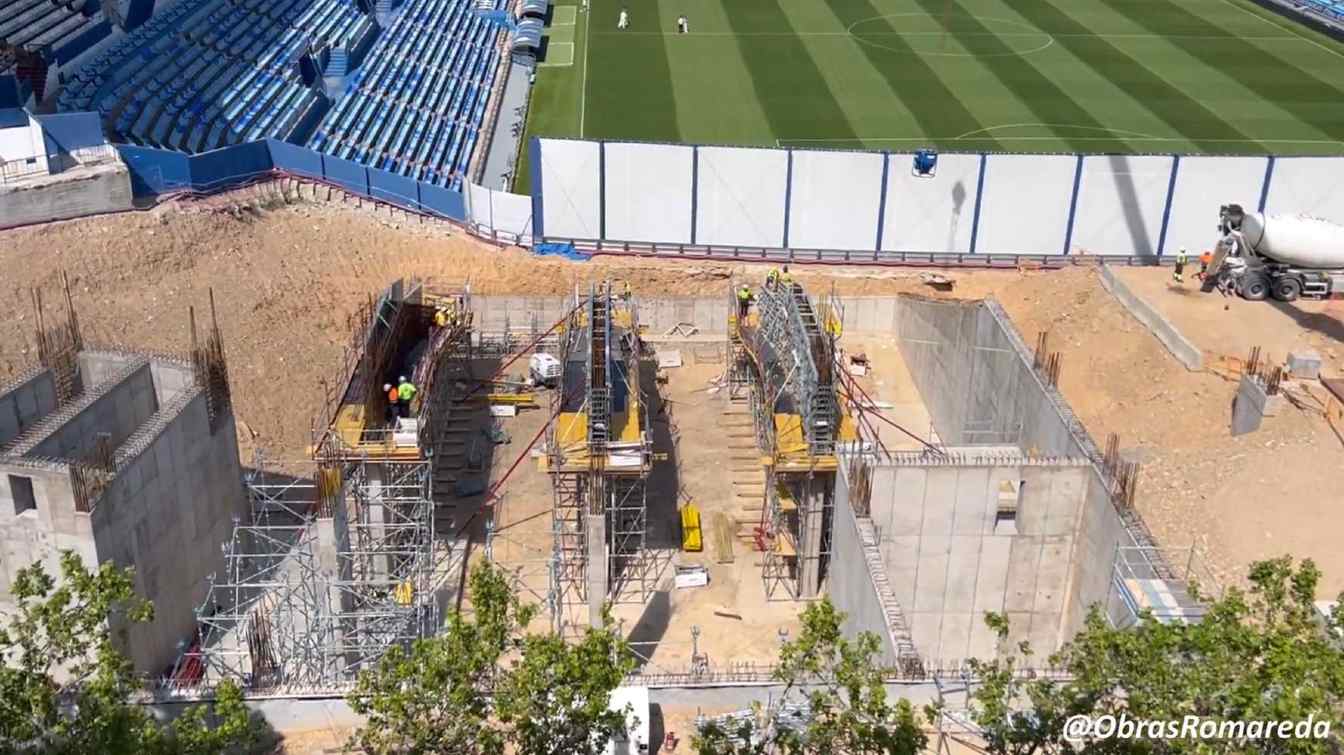Spain: Zaragoza’s temporary stadium gets stands, future venue funded
source: StadiumDB.com; author: Paulina Skóra
 The construction of the temporary football stadium in Zaragoza, commonly referred to as the "mini Romareda," is progressing on schedule and approaching its final phase.
The construction of the temporary football stadium in Zaragoza, commonly referred to as the "mini Romareda," is progressing on schedule and approaching its final phase.
Advertisement
Construction progress
Located at the Parking Norte site, the Mini Romareda is expected to be ready for use by mid-June 2025. It will accommodate 20,000 spectators and feature modern infrastructure that meets league requirements and fan expectations. The progress is evident: the steel structures of the stands have been completed, and blue and white seats forming the inscription Real Zaragoza
have been installed on the east stand. Most seats are blue OMSI models, while the preferential stand has been fitted with 2,730 black Avatar Compact seats. Additionally, 390 upholstered chairs have been installed in VIP areas.
The stadium is also equipped with sound systems and an LED screen. Construction includes facilities such as locker rooms, food outlets, a store, media booths, and VIP spaces. Initially, a roof was planned for the main stand, but this was canceled due to high costs and limited utility; instead, the structure will be shielded from the wind by enclosing the stadium's corners.
 © Real Zaragoza | Mini Romareda
© Real Zaragoza | Mini Romareda
Club's financial commitment unfulfilled
While the temporary stadium's construction proceeds as planned, the main investment project faces challenges. Just a month after Zaragoza's City Council approved a tax exemption of €1.5 million for the company building the Nueva Romareda, new concerns have arisen regarding the project's financing. Real Zaragoza failed to meet its initial financial obligation—contributing €6.8 million in 2023—necessitating a rescheduling of the entire financial contribution calendar. The new agreement, approved by the city council, reflects increased financial involvement from both the city and the Aragonese government, which expanded their shares at the end of last year.
According to the original December 2023 plan, Real Zaragoza was to make the largest contribution in the first year—€6.8 million. In comparison, the city was to provide €3.1 million, and the Aragonese government €4 million. Ultimately, the club contributed nothing, requiring it to make up for the shortfall by paying €10 million in 2025. To date, Real Zaragoza's only financial input has been €6 million at the project's inception. Meanwhile, public institutions—the city and the region—have already allocated a total of €91.6 million for the stadium's construction.
The breakdown of these funds is as follows: Zaragoza's city contributed €24.5 million, and the regional government €20 million. Additionally, at the end of 2024, both institutions injected another €20 million each, without involving the club. In 2024, both the city (€3.1 million) and the Aragonese government (€4 million) fulfilled their planned contributions. For 2025, further installments are anticipated: €3.5 million from the city and €3.1 million from the regional authorities.
 © ObrasRomareda | Nueva Romareda
© ObrasRomareda | Nueva Romareda
City council implements changes
The recently approved changes also affect the ownership structure of the La Nueva Romareda SL company. Under the new arrangement, 75% of the shares belong to public institutions (the city and the Aragonese government), while the remaining 25% are held by Real Zaragoza. The project's implementation schedule has been simplified from four to two stages, and the previously mentioned €40 million capital increase has been formally documented.
These changes sparked a heated political debate in the city council. PSOE councilor Horacio Royo described the situation as a pufo,
a financial scandal he believes is being concealed through potential profits from an urban development operation at Vía Hispanidad. Suso Domínguez from Zaragoza en Común criticized the new arrangements, highlighting the absence of specific loan repayment deadlines or interest agreements, which he argues leaves everything in the club's hands.
Mayor Natalia Chueca responded by accusing PSOE of lacking transparency and reminded them of previous ambiguities, including an alleged incident at a parador in Teruel four years ago. Urban Planning Councilor Víctor Serrano accused the socialists of obstructing the project at every stage. The Vox party, which recently joined the La Nueva Romareda company, supported the new arrangements, emphasizing that their conditions—access to loan details and changes to Real Zaragoza's shareholding—have been met, as noted by councilor Eva Torres.
Advertisement
 StadiumDB
StadiumDB